MD4044 - Entrepreneurship Theory & Practice: Economic Impact
VerifiedAdded on 2023/04/21
|13
|3167
|143
Report
AI Summary
This report examines the crucial role of entrepreneurship in fostering economic growth, addressing challenges, and navigating legal disputes. It delves into the relationship between entrepreneurship and economic expansion, highlighting its influence on job creation and overall national development. The analysis incorporates case studies, such as Tesla's workforce reduction, to illustrate difficult decision-making processes. The report also explores the legal dilemmas faced by entrepreneurs, including government bottlenecks and shareholder lawsuits, and discusses the ethical challenges they encounter. Furthermore, it touches upon policy implications and the role of government in supporting entrepreneurship. The report concludes by emphasizing the importance of entrepreneurship in driving economic progress, particularly in developed nations.
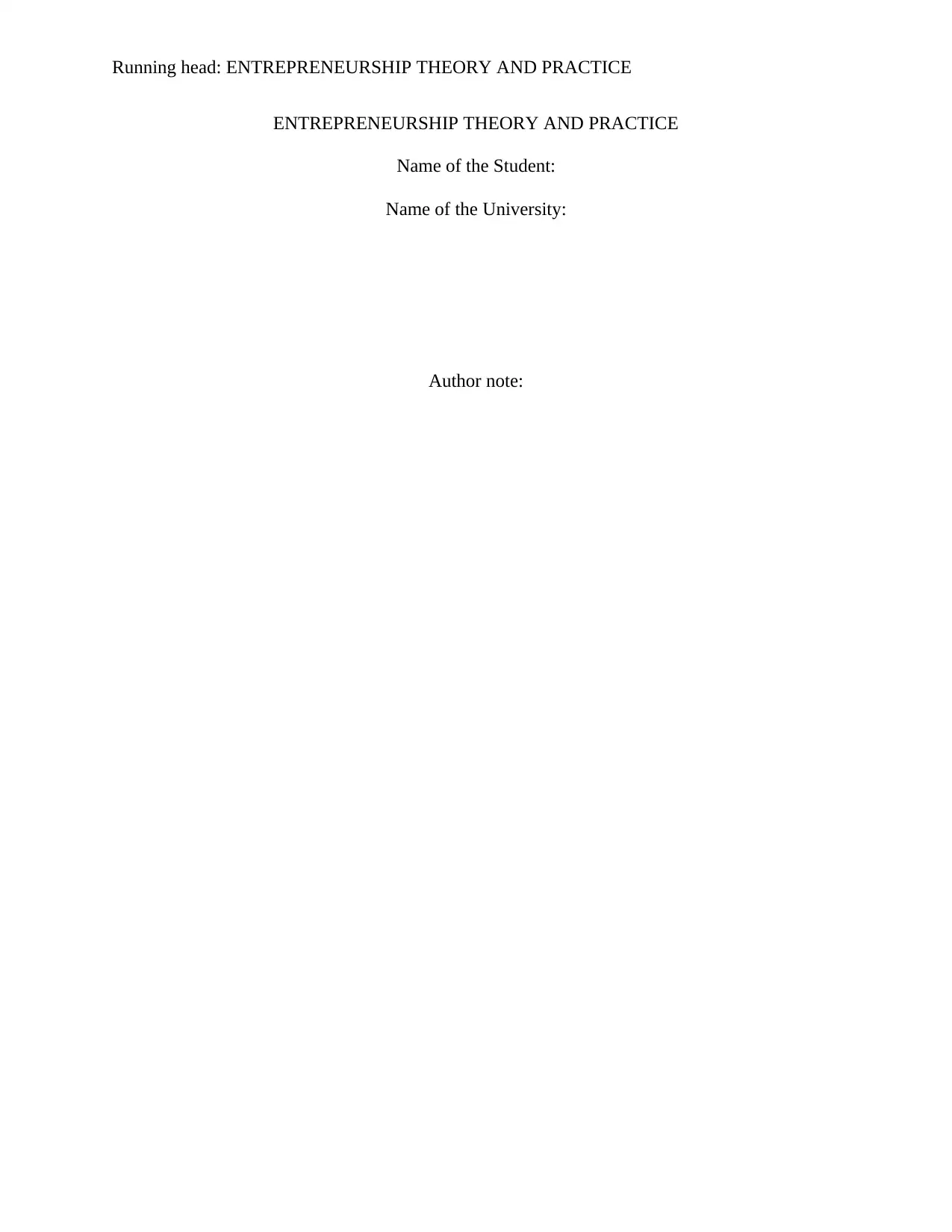
Running head: ENTREPRENEURSHIP THEORY AND PRACTICE
ENTREPRENEURSHIP THEORY AND PRACTICE
Name of the Student:
Name of the University:
Author note:
ENTREPRENEURSHIP THEORY AND PRACTICE
Name of the Student:
Name of the University:
Author note:
Paraphrase This Document
Need a fresh take? Get an instant paraphrase of this document with our AI Paraphraser
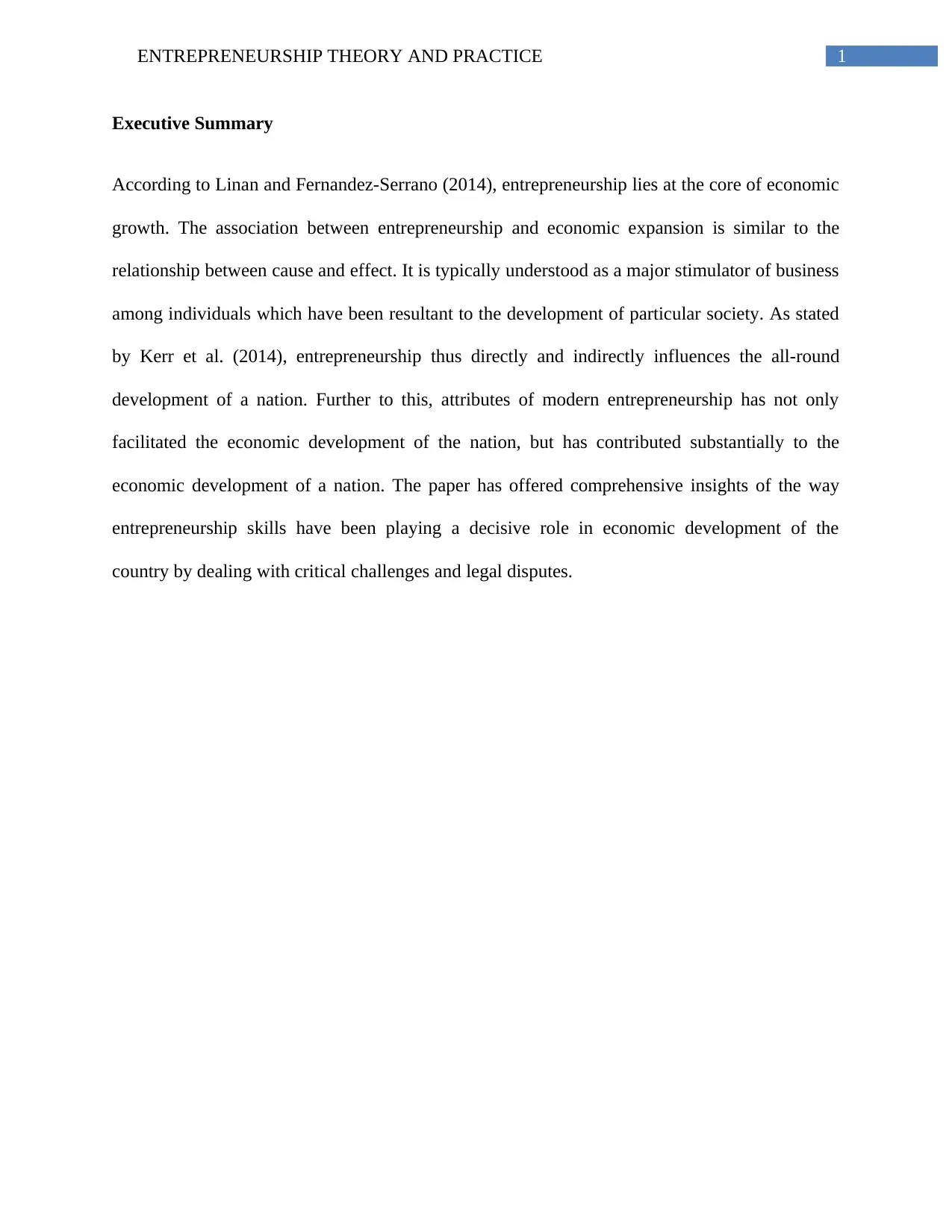
1ENTREPRENEURSHIP THEORY AND PRACTICE
Executive Summary
According to Linan and Fernandez-Serrano (2014), entrepreneurship lies at the core of economic
growth. The association between entrepreneurship and economic expansion is similar to the
relationship between cause and effect. It is typically understood as a major stimulator of business
among individuals which have been resultant to the development of particular society. As stated
by Kerr et al. (2014), entrepreneurship thus directly and indirectly influences the all-round
development of a nation. Further to this, attributes of modern entrepreneurship has not only
facilitated the economic development of the nation, but has contributed substantially to the
economic development of a nation. The paper has offered comprehensive insights of the way
entrepreneurship skills have been playing a decisive role in economic development of the
country by dealing with critical challenges and legal disputes.
Executive Summary
According to Linan and Fernandez-Serrano (2014), entrepreneurship lies at the core of economic
growth. The association between entrepreneurship and economic expansion is similar to the
relationship between cause and effect. It is typically understood as a major stimulator of business
among individuals which have been resultant to the development of particular society. As stated
by Kerr et al. (2014), entrepreneurship thus directly and indirectly influences the all-round
development of a nation. Further to this, attributes of modern entrepreneurship has not only
facilitated the economic development of the nation, but has contributed substantially to the
economic development of a nation. The paper has offered comprehensive insights of the way
entrepreneurship skills have been playing a decisive role in economic development of the
country by dealing with critical challenges and legal disputes.
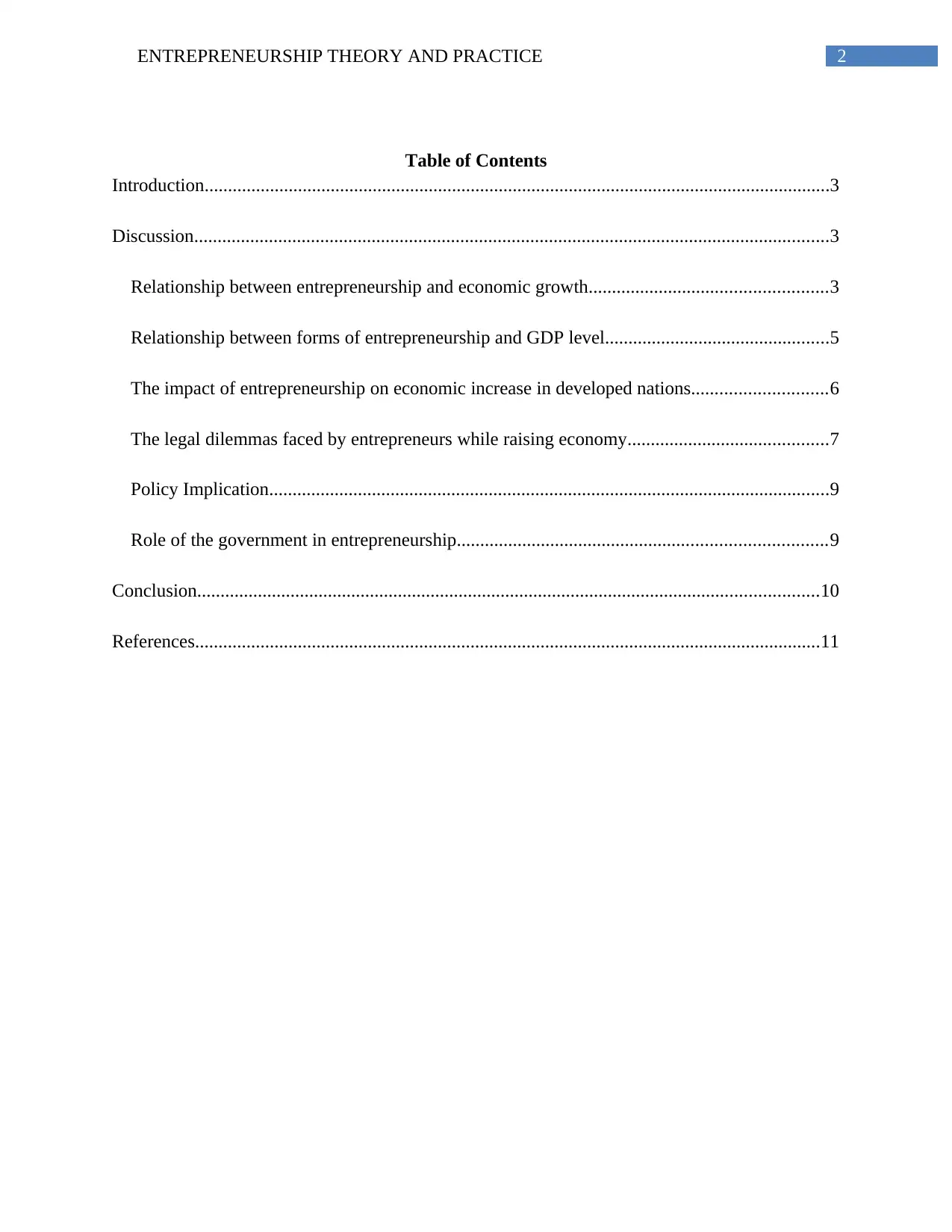
2ENTREPRENEURSHIP THEORY AND PRACTICE
Table of Contents
Introduction......................................................................................................................................3
Discussion........................................................................................................................................3
Relationship between entrepreneurship and economic growth...................................................3
Relationship between forms of entrepreneurship and GDP level................................................5
The impact of entrepreneurship on economic increase in developed nations.............................6
The legal dilemmas faced by entrepreneurs while raising economy...........................................7
Policy Implication........................................................................................................................9
Role of the government in entrepreneurship...............................................................................9
Conclusion.....................................................................................................................................10
References......................................................................................................................................11
Table of Contents
Introduction......................................................................................................................................3
Discussion........................................................................................................................................3
Relationship between entrepreneurship and economic growth...................................................3
Relationship between forms of entrepreneurship and GDP level................................................5
The impact of entrepreneurship on economic increase in developed nations.............................6
The legal dilemmas faced by entrepreneurs while raising economy...........................................7
Policy Implication........................................................................................................................9
Role of the government in entrepreneurship...............................................................................9
Conclusion.....................................................................................................................................10
References......................................................................................................................................11
⊘ This is a preview!⊘
Do you want full access?
Subscribe today to unlock all pages.

Trusted by 1+ million students worldwide
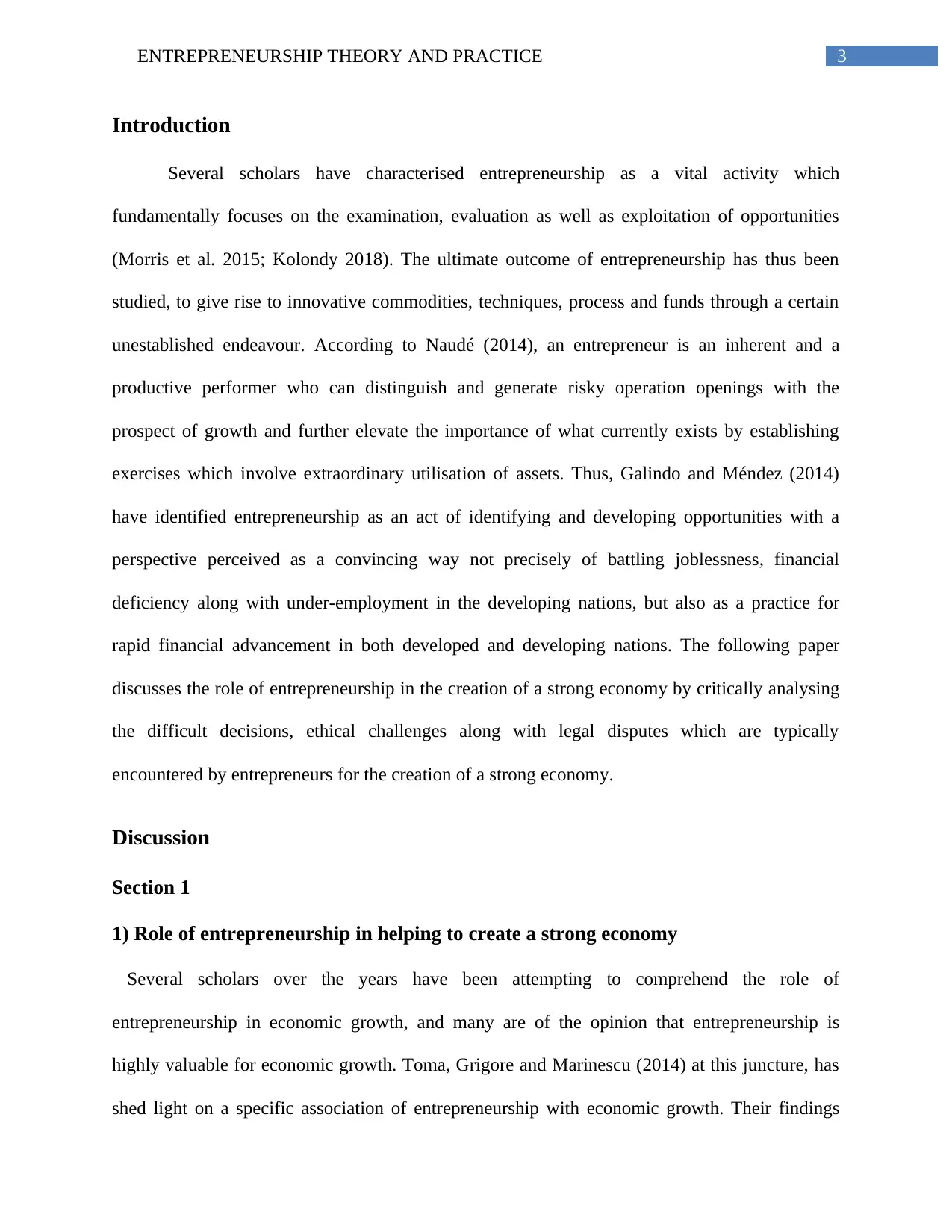
3ENTREPRENEURSHIP THEORY AND PRACTICE
Introduction
Several scholars have characterised entrepreneurship as a vital activity which
fundamentally focuses on the examination, evaluation as well as exploitation of opportunities
(Morris et al. 2015; Kolondy 2018). The ultimate outcome of entrepreneurship has thus been
studied, to give rise to innovative commodities, techniques, process and funds through a certain
unestablished endeavour. According to Naudé (2014), an entrepreneur is an inherent and a
productive performer who can distinguish and generate risky operation openings with the
prospect of growth and further elevate the importance of what currently exists by establishing
exercises which involve extraordinary utilisation of assets. Thus, Galindo and Méndez (2014)
have identified entrepreneurship as an act of identifying and developing opportunities with a
perspective perceived as a convincing way not precisely of battling joblessness, financial
deficiency along with under-employment in the developing nations, but also as a practice for
rapid financial advancement in both developed and developing nations. The following paper
discusses the role of entrepreneurship in the creation of a strong economy by critically analysing
the difficult decisions, ethical challenges along with legal disputes which are typically
encountered by entrepreneurs for the creation of a strong economy.
Discussion
Section 1
1) Role of entrepreneurship in helping to create a strong economy
Several scholars over the years have been attempting to comprehend the role of
entrepreneurship in economic growth, and many are of the opinion that entrepreneurship is
highly valuable for economic growth. Toma, Grigore and Marinescu (2014) at this juncture, has
shed light on a specific association of entrepreneurship with economic growth. Their findings
Introduction
Several scholars have characterised entrepreneurship as a vital activity which
fundamentally focuses on the examination, evaluation as well as exploitation of opportunities
(Morris et al. 2015; Kolondy 2018). The ultimate outcome of entrepreneurship has thus been
studied, to give rise to innovative commodities, techniques, process and funds through a certain
unestablished endeavour. According to Naudé (2014), an entrepreneur is an inherent and a
productive performer who can distinguish and generate risky operation openings with the
prospect of growth and further elevate the importance of what currently exists by establishing
exercises which involve extraordinary utilisation of assets. Thus, Galindo and Méndez (2014)
have identified entrepreneurship as an act of identifying and developing opportunities with a
perspective perceived as a convincing way not precisely of battling joblessness, financial
deficiency along with under-employment in the developing nations, but also as a practice for
rapid financial advancement in both developed and developing nations. The following paper
discusses the role of entrepreneurship in the creation of a strong economy by critically analysing
the difficult decisions, ethical challenges along with legal disputes which are typically
encountered by entrepreneurs for the creation of a strong economy.
Discussion
Section 1
1) Role of entrepreneurship in helping to create a strong economy
Several scholars over the years have been attempting to comprehend the role of
entrepreneurship in economic growth, and many are of the opinion that entrepreneurship is
highly valuable for economic growth. Toma, Grigore and Marinescu (2014) at this juncture, has
shed light on a specific association of entrepreneurship with economic growth. Their findings
Paraphrase This Document
Need a fresh take? Get an instant paraphrase of this document with our AI Paraphraser
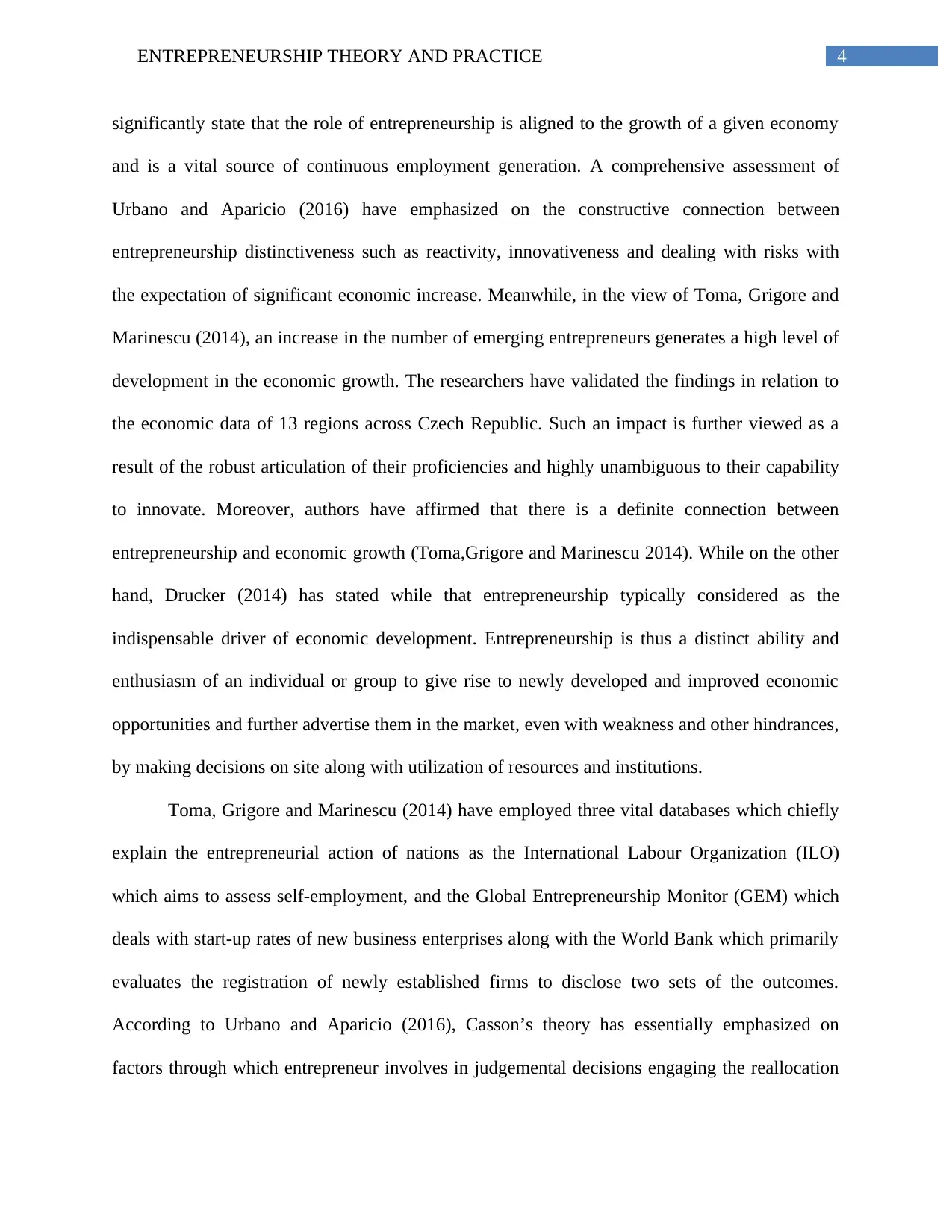
4ENTREPRENEURSHIP THEORY AND PRACTICE
significantly state that the role of entrepreneurship is aligned to the growth of a given economy
and is a vital source of continuous employment generation. A comprehensive assessment of
Urbano and Aparicio (2016) have emphasized on the constructive connection between
entrepreneurship distinctiveness such as reactivity, innovativeness and dealing with risks with
the expectation of significant economic increase. Meanwhile, in the view of Toma, Grigore and
Marinescu (2014), an increase in the number of emerging entrepreneurs generates a high level of
development in the economic growth. The researchers have validated the findings in relation to
the economic data of 13 regions across Czech Republic. Such an impact is further viewed as a
result of the robust articulation of their proficiencies and highly unambiguous to their capability
to innovate. Moreover, authors have affirmed that there is a definite connection between
entrepreneurship and economic growth (Toma,Grigore and Marinescu 2014). While on the other
hand, Drucker (2014) has stated while that entrepreneurship typically considered as the
indispensable driver of economic development. Entrepreneurship is thus a distinct ability and
enthusiasm of an individual or group to give rise to newly developed and improved economic
opportunities and further advertise them in the market, even with weakness and other hindrances,
by making decisions on site along with utilization of resources and institutions.
Toma, Grigore and Marinescu (2014) have employed three vital databases which chiefly
explain the entrepreneurial action of nations as the International Labour Organization (ILO)
which aims to assess self-employment, and the Global Entrepreneurship Monitor (GEM) which
deals with start-up rates of new business enterprises along with the World Bank which primarily
evaluates the registration of newly established firms to disclose two sets of the outcomes.
According to Urbano and Aparicio (2016), Casson’s theory has essentially emphasized on
factors through which entrepreneur involves in judgemental decisions engaging the reallocation
significantly state that the role of entrepreneurship is aligned to the growth of a given economy
and is a vital source of continuous employment generation. A comprehensive assessment of
Urbano and Aparicio (2016) have emphasized on the constructive connection between
entrepreneurship distinctiveness such as reactivity, innovativeness and dealing with risks with
the expectation of significant economic increase. Meanwhile, in the view of Toma, Grigore and
Marinescu (2014), an increase in the number of emerging entrepreneurs generates a high level of
development in the economic growth. The researchers have validated the findings in relation to
the economic data of 13 regions across Czech Republic. Such an impact is further viewed as a
result of the robust articulation of their proficiencies and highly unambiguous to their capability
to innovate. Moreover, authors have affirmed that there is a definite connection between
entrepreneurship and economic growth (Toma,Grigore and Marinescu 2014). While on the other
hand, Drucker (2014) has stated while that entrepreneurship typically considered as the
indispensable driver of economic development. Entrepreneurship is thus a distinct ability and
enthusiasm of an individual or group to give rise to newly developed and improved economic
opportunities and further advertise them in the market, even with weakness and other hindrances,
by making decisions on site along with utilization of resources and institutions.
Toma, Grigore and Marinescu (2014) have employed three vital databases which chiefly
explain the entrepreneurial action of nations as the International Labour Organization (ILO)
which aims to assess self-employment, and the Global Entrepreneurship Monitor (GEM) which
deals with start-up rates of new business enterprises along with the World Bank which primarily
evaluates the registration of newly established firms to disclose two sets of the outcomes.
According to Urbano and Aparicio (2016), Casson’s theory has essentially emphasized on
factors through which entrepreneur involves in judgemental decisions engaging the reallocation
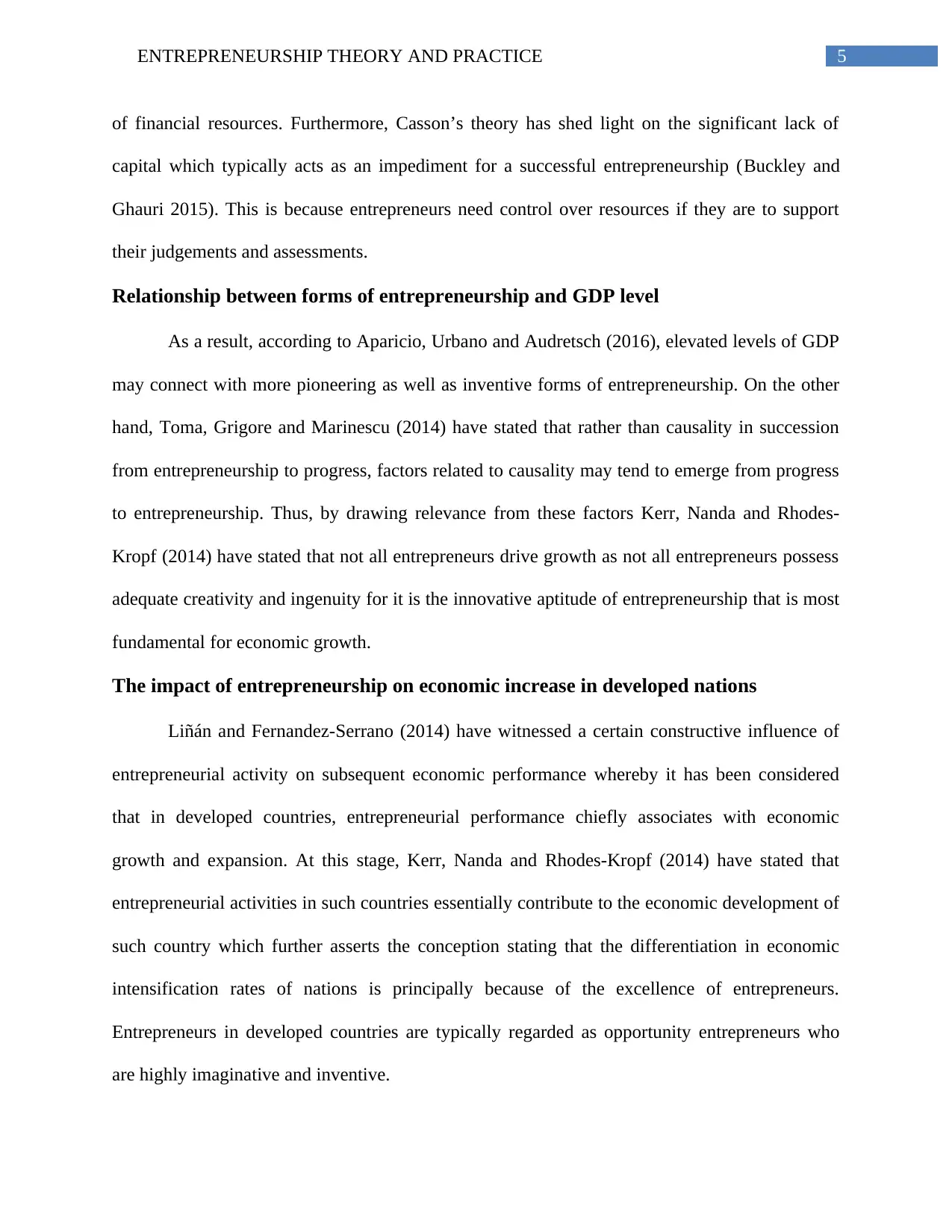
5ENTREPRENEURSHIP THEORY AND PRACTICE
of financial resources. Furthermore, Casson’s theory has shed light on the significant lack of
capital which typically acts as an impediment for a successful entrepreneurship (Buckley and
Ghauri 2015). This is because entrepreneurs need control over resources if they are to support
their judgements and assessments.
Relationship between forms of entrepreneurship and GDP level
As a result, according to Aparicio, Urbano and Audretsch (2016), elevated levels of GDP
may connect with more pioneering as well as inventive forms of entrepreneurship. On the other
hand, Toma, Grigore and Marinescu (2014) have stated that rather than causality in succession
from entrepreneurship to progress, factors related to causality may tend to emerge from progress
to entrepreneurship. Thus, by drawing relevance from these factors Kerr, Nanda and Rhodes-
Kropf (2014) have stated that not all entrepreneurs drive growth as not all entrepreneurs possess
adequate creativity and ingenuity for it is the innovative aptitude of entrepreneurship that is most
fundamental for economic growth.
The impact of entrepreneurship on economic increase in developed nations
Liñán and Fernandez-Serrano (2014) have witnessed a certain constructive influence of
entrepreneurial activity on subsequent economic performance whereby it has been considered
that in developed countries, entrepreneurial performance chiefly associates with economic
growth and expansion. At this stage, Kerr, Nanda and Rhodes-Kropf (2014) have stated that
entrepreneurial activities in such countries essentially contribute to the economic development of
such country which further asserts the conception stating that the differentiation in economic
intensification rates of nations is principally because of the excellence of entrepreneurs.
Entrepreneurs in developed countries are typically regarded as opportunity entrepreneurs who
are highly imaginative and inventive.
of financial resources. Furthermore, Casson’s theory has shed light on the significant lack of
capital which typically acts as an impediment for a successful entrepreneurship (Buckley and
Ghauri 2015). This is because entrepreneurs need control over resources if they are to support
their judgements and assessments.
Relationship between forms of entrepreneurship and GDP level
As a result, according to Aparicio, Urbano and Audretsch (2016), elevated levels of GDP
may connect with more pioneering as well as inventive forms of entrepreneurship. On the other
hand, Toma, Grigore and Marinescu (2014) have stated that rather than causality in succession
from entrepreneurship to progress, factors related to causality may tend to emerge from progress
to entrepreneurship. Thus, by drawing relevance from these factors Kerr, Nanda and Rhodes-
Kropf (2014) have stated that not all entrepreneurs drive growth as not all entrepreneurs possess
adequate creativity and ingenuity for it is the innovative aptitude of entrepreneurship that is most
fundamental for economic growth.
The impact of entrepreneurship on economic increase in developed nations
Liñán and Fernandez-Serrano (2014) have witnessed a certain constructive influence of
entrepreneurial activity on subsequent economic performance whereby it has been considered
that in developed countries, entrepreneurial performance chiefly associates with economic
growth and expansion. At this stage, Kerr, Nanda and Rhodes-Kropf (2014) have stated that
entrepreneurial activities in such countries essentially contribute to the economic development of
such country which further asserts the conception stating that the differentiation in economic
intensification rates of nations is principally because of the excellence of entrepreneurs.
Entrepreneurs in developed countries are typically regarded as opportunity entrepreneurs who
are highly imaginative and inventive.
⊘ This is a preview!⊘
Do you want full access?
Subscribe today to unlock all pages.

Trusted by 1+ million students worldwide
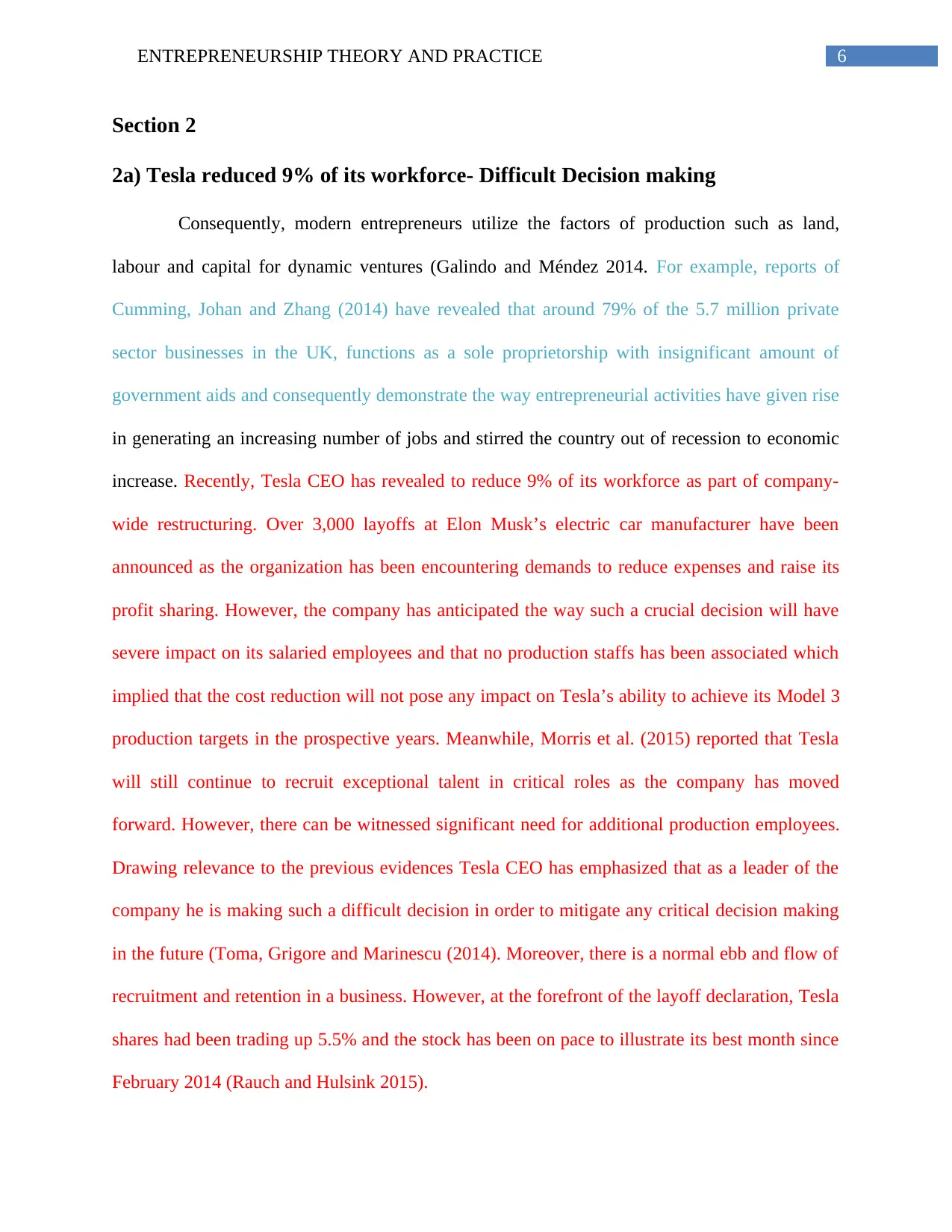
6ENTREPRENEURSHIP THEORY AND PRACTICE
Section 2
2a) Tesla reduced 9% of its workforce- Difficult Decision making
Consequently, modern entrepreneurs utilize the factors of production such as land,
labour and capital for dynamic ventures (Galindo and Méndez 2014. For example, reports of
Cumming, Johan and Zhang (2014) have revealed that around 79% of the 5.7 million private
sector businesses in the UK, functions as a sole proprietorship with insignificant amount of
government aids and consequently demonstrate the way entrepreneurial activities have given rise
in generating an increasing number of jobs and stirred the country out of recession to economic
increase. Recently, Tesla CEO has revealed to reduce 9% of its workforce as part of company-
wide restructuring. Over 3,000 layoffs at Elon Musk’s electric car manufacturer have been
announced as the organization has been encountering demands to reduce expenses and raise its
profit sharing. However, the company has anticipated the way such a crucial decision will have
severe impact on its salaried employees and that no production staffs has been associated which
implied that the cost reduction will not pose any impact on Tesla’s ability to achieve its Model 3
production targets in the prospective years. Meanwhile, Morris et al. (2015) reported that Tesla
will still continue to recruit exceptional talent in critical roles as the company has moved
forward. However, there can be witnessed significant need for additional production employees.
Drawing relevance to the previous evidences Tesla CEO has emphasized that as a leader of the
company he is making such a difficult decision in order to mitigate any critical decision making
in the future (Toma, Grigore and Marinescu (2014). Moreover, there is a normal ebb and flow of
recruitment and retention in a business. However, at the forefront of the layoff declaration, Tesla
shares had been trading up 5.5% and the stock has been on pace to illustrate its best month since
February 2014 (Rauch and Hulsink 2015).
Section 2
2a) Tesla reduced 9% of its workforce- Difficult Decision making
Consequently, modern entrepreneurs utilize the factors of production such as land,
labour and capital for dynamic ventures (Galindo and Méndez 2014. For example, reports of
Cumming, Johan and Zhang (2014) have revealed that around 79% of the 5.7 million private
sector businesses in the UK, functions as a sole proprietorship with insignificant amount of
government aids and consequently demonstrate the way entrepreneurial activities have given rise
in generating an increasing number of jobs and stirred the country out of recession to economic
increase. Recently, Tesla CEO has revealed to reduce 9% of its workforce as part of company-
wide restructuring. Over 3,000 layoffs at Elon Musk’s electric car manufacturer have been
announced as the organization has been encountering demands to reduce expenses and raise its
profit sharing. However, the company has anticipated the way such a crucial decision will have
severe impact on its salaried employees and that no production staffs has been associated which
implied that the cost reduction will not pose any impact on Tesla’s ability to achieve its Model 3
production targets in the prospective years. Meanwhile, Morris et al. (2015) reported that Tesla
will still continue to recruit exceptional talent in critical roles as the company has moved
forward. However, there can be witnessed significant need for additional production employees.
Drawing relevance to the previous evidences Tesla CEO has emphasized that as a leader of the
company he is making such a difficult decision in order to mitigate any critical decision making
in the future (Toma, Grigore and Marinescu (2014). Moreover, there is a normal ebb and flow of
recruitment and retention in a business. However, at the forefront of the layoff declaration, Tesla
shares had been trading up 5.5% and the stock has been on pace to illustrate its best month since
February 2014 (Rauch and Hulsink 2015).
Paraphrase This Document
Need a fresh take? Get an instant paraphrase of this document with our AI Paraphraser
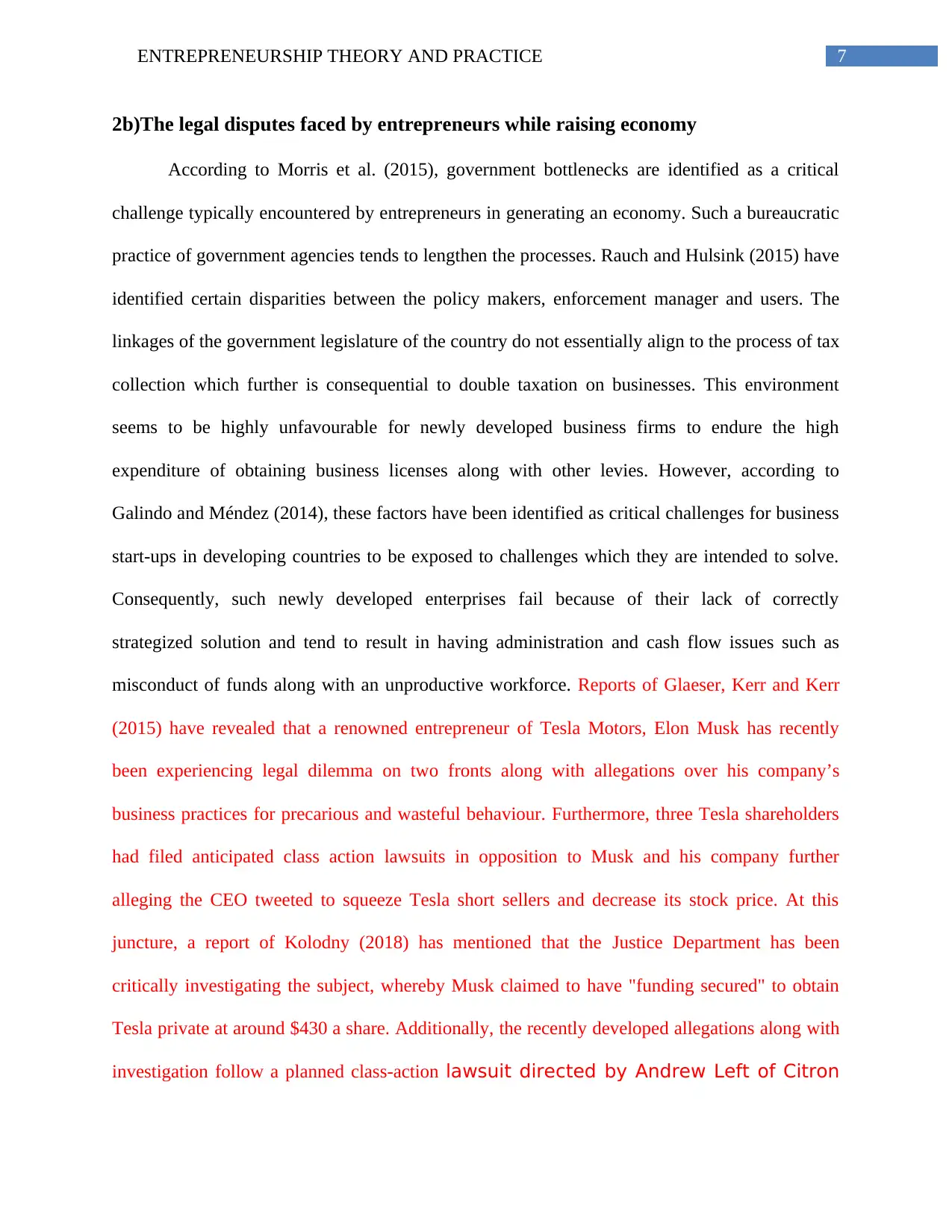
7ENTREPRENEURSHIP THEORY AND PRACTICE
2b)The legal disputes faced by entrepreneurs while raising economy
According to Morris et al. (2015), government bottlenecks are identified as a critical
challenge typically encountered by entrepreneurs in generating an economy. Such a bureaucratic
practice of government agencies tends to lengthen the processes. Rauch and Hulsink (2015) have
identified certain disparities between the policy makers, enforcement manager and users. The
linkages of the government legislature of the country do not essentially align to the process of tax
collection which further is consequential to double taxation on businesses. This environment
seems to be highly unfavourable for newly developed business firms to endure the high
expenditure of obtaining business licenses along with other levies. However, according to
Galindo and Méndez (2014), these factors have been identified as critical challenges for business
start-ups in developing countries to be exposed to challenges which they are intended to solve.
Consequently, such newly developed enterprises fail because of their lack of correctly
strategized solution and tend to result in having administration and cash flow issues such as
misconduct of funds along with an unproductive workforce. Reports of Glaeser, Kerr and Kerr
(2015) have revealed that a renowned entrepreneur of Tesla Motors, Elon Musk has recently
been experiencing legal dilemma on two fronts along with allegations over his company’s
business practices for precarious and wasteful behaviour. Furthermore, three Tesla shareholders
had filed anticipated class action lawsuits in opposition to Musk and his company further
alleging the CEO tweeted to squeeze Tesla short sellers and decrease its stock price. At this
juncture, a report of Kolodny (2018) has mentioned that the Justice Department has been
critically investigating the subject, whereby Musk claimed to have "funding secured" to obtain
Tesla private at around $430 a share. Additionally, the recently developed allegations along with
investigation follow a planned class-action lawsuit directed by Andrew Left of Citron
2b)The legal disputes faced by entrepreneurs while raising economy
According to Morris et al. (2015), government bottlenecks are identified as a critical
challenge typically encountered by entrepreneurs in generating an economy. Such a bureaucratic
practice of government agencies tends to lengthen the processes. Rauch and Hulsink (2015) have
identified certain disparities between the policy makers, enforcement manager and users. The
linkages of the government legislature of the country do not essentially align to the process of tax
collection which further is consequential to double taxation on businesses. This environment
seems to be highly unfavourable for newly developed business firms to endure the high
expenditure of obtaining business licenses along with other levies. However, according to
Galindo and Méndez (2014), these factors have been identified as critical challenges for business
start-ups in developing countries to be exposed to challenges which they are intended to solve.
Consequently, such newly developed enterprises fail because of their lack of correctly
strategized solution and tend to result in having administration and cash flow issues such as
misconduct of funds along with an unproductive workforce. Reports of Glaeser, Kerr and Kerr
(2015) have revealed that a renowned entrepreneur of Tesla Motors, Elon Musk has recently
been experiencing legal dilemma on two fronts along with allegations over his company’s
business practices for precarious and wasteful behaviour. Furthermore, three Tesla shareholders
had filed anticipated class action lawsuits in opposition to Musk and his company further
alleging the CEO tweeted to squeeze Tesla short sellers and decrease its stock price. At this
juncture, a report of Kolodny (2018) has mentioned that the Justice Department has been
critically investigating the subject, whereby Musk claimed to have "funding secured" to obtain
Tesla private at around $430 a share. Additionally, the recently developed allegations along with
investigation follow a planned class-action lawsuit directed by Andrew Left of Citron
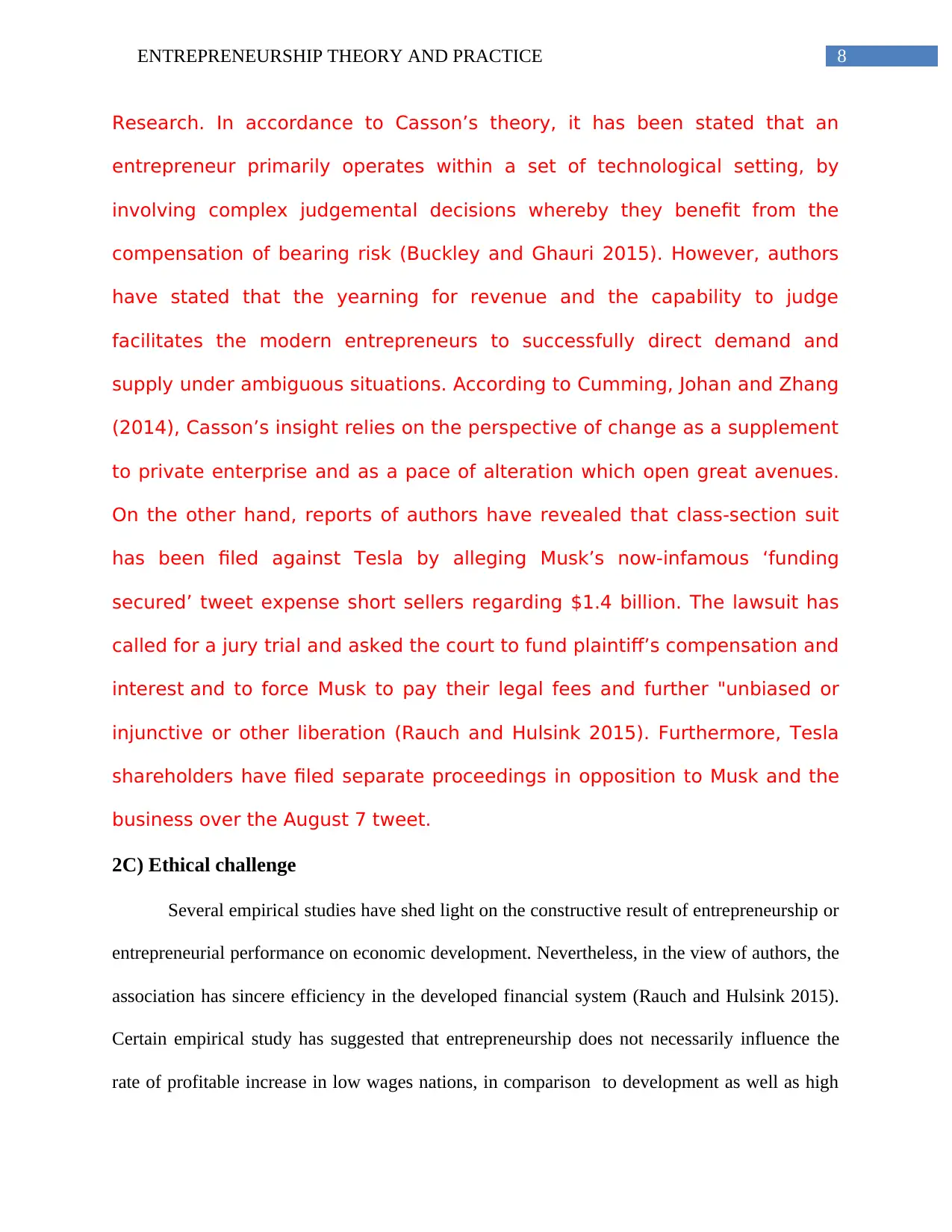
8ENTREPRENEURSHIP THEORY AND PRACTICE
Research. In accordance to Casson’s theory, it has been stated that an
entrepreneur primarily operates within a set of technological setting, by
involving complex judgemental decisions whereby they benefit from the
compensation of bearing risk (Buckley and Ghauri 2015). However, authors
have stated that the yearning for revenue and the capability to judge
facilitates the modern entrepreneurs to successfully direct demand and
supply under ambiguous situations. According to Cumming, Johan and Zhang
(2014), Casson’s insight relies on the perspective of change as a supplement
to private enterprise and as a pace of alteration which open great avenues.
On the other hand, reports of authors have revealed that class-section suit
has been filed against Tesla by alleging Musk’s now-infamous ‘funding
secured’ tweet expense short sellers regarding $1.4 billion. The lawsuit has
called for a jury trial and asked the court to fund plaintiff’s compensation and
interest and to force Musk to pay their legal fees and further "unbiased or
injunctive or other liberation (Rauch and Hulsink 2015). Furthermore, Tesla
shareholders have filed separate proceedings in opposition to Musk and the
business over the August 7 tweet.
2C) Ethical challenge
Several empirical studies have shed light on the constructive result of entrepreneurship or
entrepreneurial performance on economic development. Nevertheless, in the view of authors, the
association has sincere efficiency in the developed financial system (Rauch and Hulsink 2015).
Certain empirical study has suggested that entrepreneurship does not necessarily influence the
rate of profitable increase in low wages nations, in comparison to development as well as high
Research. In accordance to Casson’s theory, it has been stated that an
entrepreneur primarily operates within a set of technological setting, by
involving complex judgemental decisions whereby they benefit from the
compensation of bearing risk (Buckley and Ghauri 2015). However, authors
have stated that the yearning for revenue and the capability to judge
facilitates the modern entrepreneurs to successfully direct demand and
supply under ambiguous situations. According to Cumming, Johan and Zhang
(2014), Casson’s insight relies on the perspective of change as a supplement
to private enterprise and as a pace of alteration which open great avenues.
On the other hand, reports of authors have revealed that class-section suit
has been filed against Tesla by alleging Musk’s now-infamous ‘funding
secured’ tweet expense short sellers regarding $1.4 billion. The lawsuit has
called for a jury trial and asked the court to fund plaintiff’s compensation and
interest and to force Musk to pay their legal fees and further "unbiased or
injunctive or other liberation (Rauch and Hulsink 2015). Furthermore, Tesla
shareholders have filed separate proceedings in opposition to Musk and the
business over the August 7 tweet.
2C) Ethical challenge
Several empirical studies have shed light on the constructive result of entrepreneurship or
entrepreneurial performance on economic development. Nevertheless, in the view of authors, the
association has sincere efficiency in the developed financial system (Rauch and Hulsink 2015).
Certain empirical study has suggested that entrepreneurship does not necessarily influence the
rate of profitable increase in low wages nations, in comparison to development as well as high
⊘ This is a preview!⊘
Do you want full access?
Subscribe today to unlock all pages.

Trusted by 1+ million students worldwide
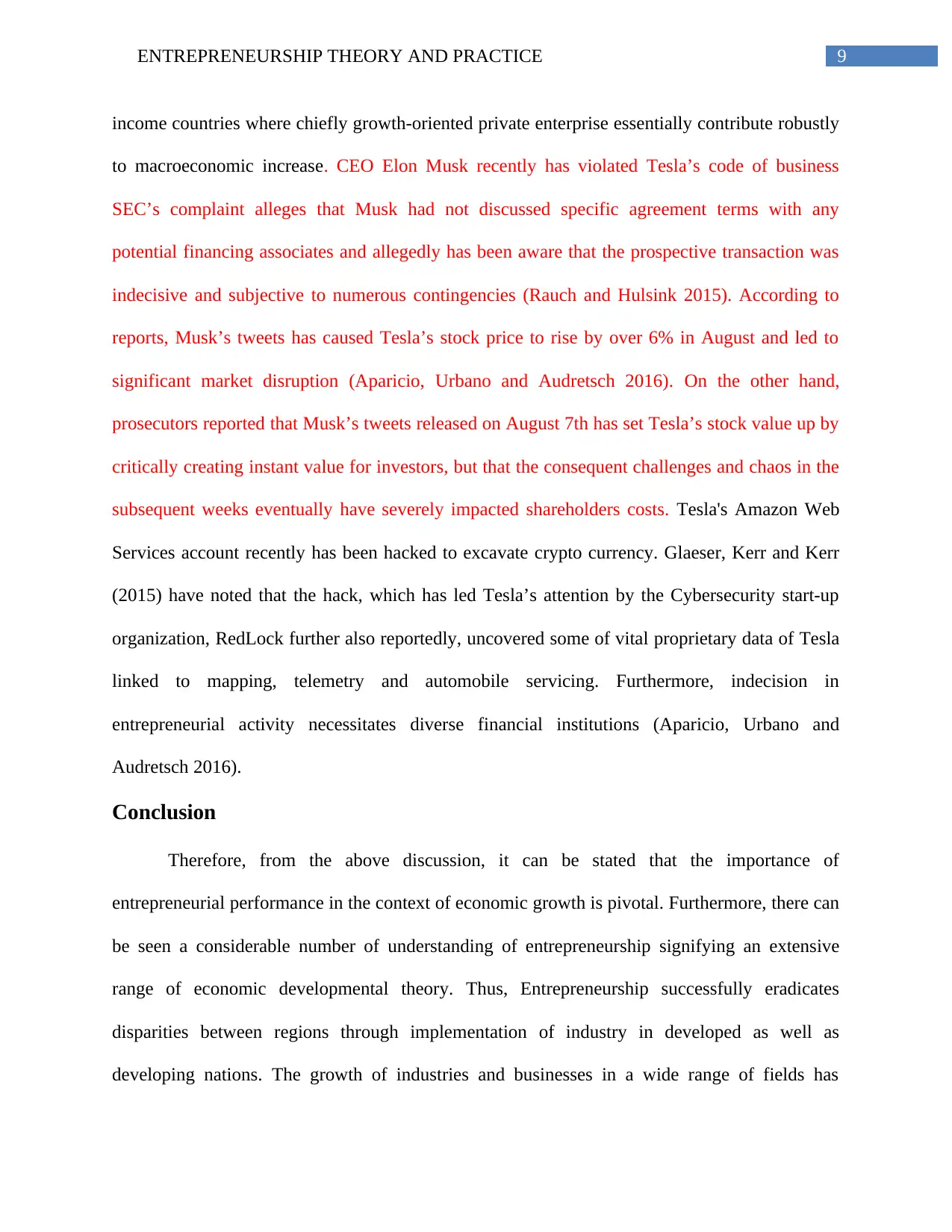
9ENTREPRENEURSHIP THEORY AND PRACTICE
income countries where chiefly growth-oriented private enterprise essentially contribute robustly
to macroeconomic increase. CEO Elon Musk recently has violated Tesla’s code of business
SEC’s complaint alleges that Musk had not discussed specific agreement terms with any
potential financing associates and allegedly has been aware that the prospective transaction was
indecisive and subjective to numerous contingencies (Rauch and Hulsink 2015). According to
reports, Musk’s tweets has caused Tesla’s stock price to rise by over 6% in August and led to
significant market disruption (Aparicio, Urbano and Audretsch 2016). On the other hand,
prosecutors reported that Musk’s tweets released on August 7th has set Tesla’s stock value up by
critically creating instant value for investors, but that the consequent challenges and chaos in the
subsequent weeks eventually have severely impacted shareholders costs. Tesla's Amazon Web
Services account recently has been hacked to excavate crypto currency. Glaeser, Kerr and Kerr
(2015) have noted that the hack, which has led Tesla’s attention by the Cybersecurity start-up
organization, RedLock further also reportedly, uncovered some of vital proprietary data of Tesla
linked to mapping, telemetry and automobile servicing. Furthermore, indecision in
entrepreneurial activity necessitates diverse financial institutions (Aparicio, Urbano and
Audretsch 2016).
Conclusion
Therefore, from the above discussion, it can be stated that the importance of
entrepreneurial performance in the context of economic growth is pivotal. Furthermore, there can
be seen a considerable number of understanding of entrepreneurship signifying an extensive
range of economic developmental theory. Thus, Entrepreneurship successfully eradicates
disparities between regions through implementation of industry in developed as well as
developing nations. The growth of industries and businesses in a wide range of fields has
income countries where chiefly growth-oriented private enterprise essentially contribute robustly
to macroeconomic increase. CEO Elon Musk recently has violated Tesla’s code of business
SEC’s complaint alleges that Musk had not discussed specific agreement terms with any
potential financing associates and allegedly has been aware that the prospective transaction was
indecisive and subjective to numerous contingencies (Rauch and Hulsink 2015). According to
reports, Musk’s tweets has caused Tesla’s stock price to rise by over 6% in August and led to
significant market disruption (Aparicio, Urbano and Audretsch 2016). On the other hand,
prosecutors reported that Musk’s tweets released on August 7th has set Tesla’s stock value up by
critically creating instant value for investors, but that the consequent challenges and chaos in the
subsequent weeks eventually have severely impacted shareholders costs. Tesla's Amazon Web
Services account recently has been hacked to excavate crypto currency. Glaeser, Kerr and Kerr
(2015) have noted that the hack, which has led Tesla’s attention by the Cybersecurity start-up
organization, RedLock further also reportedly, uncovered some of vital proprietary data of Tesla
linked to mapping, telemetry and automobile servicing. Furthermore, indecision in
entrepreneurial activity necessitates diverse financial institutions (Aparicio, Urbano and
Audretsch 2016).
Conclusion
Therefore, from the above discussion, it can be stated that the importance of
entrepreneurial performance in the context of economic growth is pivotal. Furthermore, there can
be seen a considerable number of understanding of entrepreneurship signifying an extensive
range of economic developmental theory. Thus, Entrepreneurship successfully eradicates
disparities between regions through implementation of industry in developed as well as
developing nations. The growth of industries and businesses in a wide range of fields has
Paraphrase This Document
Need a fresh take? Get an instant paraphrase of this document with our AI Paraphraser

10ENTREPRENEURSHIP THEORY AND PRACTICE
resulted in the expansion of services such as infrastructure, health, education and entertainment.
Thus achievement of such industrial actions has been consequential to the growth of a highly
stimulating economy.
resulted in the expansion of services such as infrastructure, health, education and entertainment.
Thus achievement of such industrial actions has been consequential to the growth of a highly
stimulating economy.
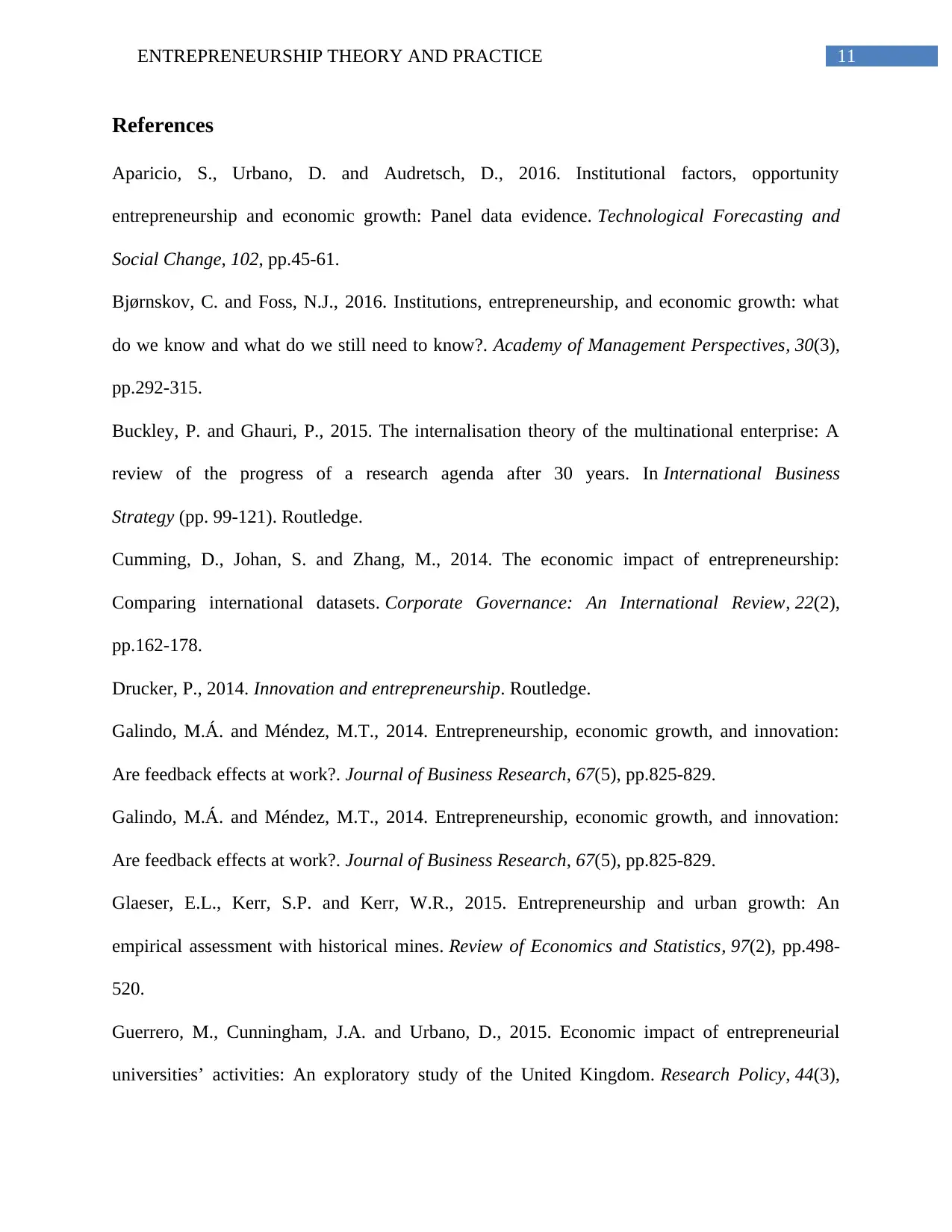
11ENTREPRENEURSHIP THEORY AND PRACTICE
References
Aparicio, S., Urbano, D. and Audretsch, D., 2016. Institutional factors, opportunity
entrepreneurship and economic growth: Panel data evidence. Technological Forecasting and
Social Change, 102, pp.45-61.
Bjørnskov, C. and Foss, N.J., 2016. Institutions, entrepreneurship, and economic growth: what
do we know and what do we still need to know?. Academy of Management Perspectives, 30(3),
pp.292-315.
Buckley, P. and Ghauri, P., 2015. The internalisation theory of the multinational enterprise: A
review of the progress of a research agenda after 30 years. In International Business
Strategy (pp. 99-121). Routledge.
Cumming, D., Johan, S. and Zhang, M., 2014. The economic impact of entrepreneurship:
Comparing international datasets. Corporate Governance: An International Review, 22(2),
pp.162-178.
Drucker, P., 2014. Innovation and entrepreneurship. Routledge.
Galindo, M.Á. and Méndez, M.T., 2014. Entrepreneurship, economic growth, and innovation:
Are feedback effects at work?. Journal of Business Research, 67(5), pp.825-829.
Galindo, M.Á. and Méndez, M.T., 2014. Entrepreneurship, economic growth, and innovation:
Are feedback effects at work?. Journal of Business Research, 67(5), pp.825-829.
Glaeser, E.L., Kerr, S.P. and Kerr, W.R., 2015. Entrepreneurship and urban growth: An
empirical assessment with historical mines. Review of Economics and Statistics, 97(2), pp.498-
520.
Guerrero, M., Cunningham, J.A. and Urbano, D., 2015. Economic impact of entrepreneurial
universities’ activities: An exploratory study of the United Kingdom. Research Policy, 44(3),
References
Aparicio, S., Urbano, D. and Audretsch, D., 2016. Institutional factors, opportunity
entrepreneurship and economic growth: Panel data evidence. Technological Forecasting and
Social Change, 102, pp.45-61.
Bjørnskov, C. and Foss, N.J., 2016. Institutions, entrepreneurship, and economic growth: what
do we know and what do we still need to know?. Academy of Management Perspectives, 30(3),
pp.292-315.
Buckley, P. and Ghauri, P., 2015. The internalisation theory of the multinational enterprise: A
review of the progress of a research agenda after 30 years. In International Business
Strategy (pp. 99-121). Routledge.
Cumming, D., Johan, S. and Zhang, M., 2014. The economic impact of entrepreneurship:
Comparing international datasets. Corporate Governance: An International Review, 22(2),
pp.162-178.
Drucker, P., 2014. Innovation and entrepreneurship. Routledge.
Galindo, M.Á. and Méndez, M.T., 2014. Entrepreneurship, economic growth, and innovation:
Are feedback effects at work?. Journal of Business Research, 67(5), pp.825-829.
Galindo, M.Á. and Méndez, M.T., 2014. Entrepreneurship, economic growth, and innovation:
Are feedback effects at work?. Journal of Business Research, 67(5), pp.825-829.
Glaeser, E.L., Kerr, S.P. and Kerr, W.R., 2015. Entrepreneurship and urban growth: An
empirical assessment with historical mines. Review of Economics and Statistics, 97(2), pp.498-
520.
Guerrero, M., Cunningham, J.A. and Urbano, D., 2015. Economic impact of entrepreneurial
universities’ activities: An exploratory study of the United Kingdom. Research Policy, 44(3),
⊘ This is a preview!⊘
Do you want full access?
Subscribe today to unlock all pages.

Trusted by 1+ million students worldwide
1 out of 13
Related Documents
Your All-in-One AI-Powered Toolkit for Academic Success.
+13062052269
info@desklib.com
Available 24*7 on WhatsApp / Email
![[object Object]](/_next/static/media/star-bottom.7253800d.svg)
Unlock your academic potential
Copyright © 2020–2026 A2Z Services. All Rights Reserved. Developed and managed by ZUCOL.





